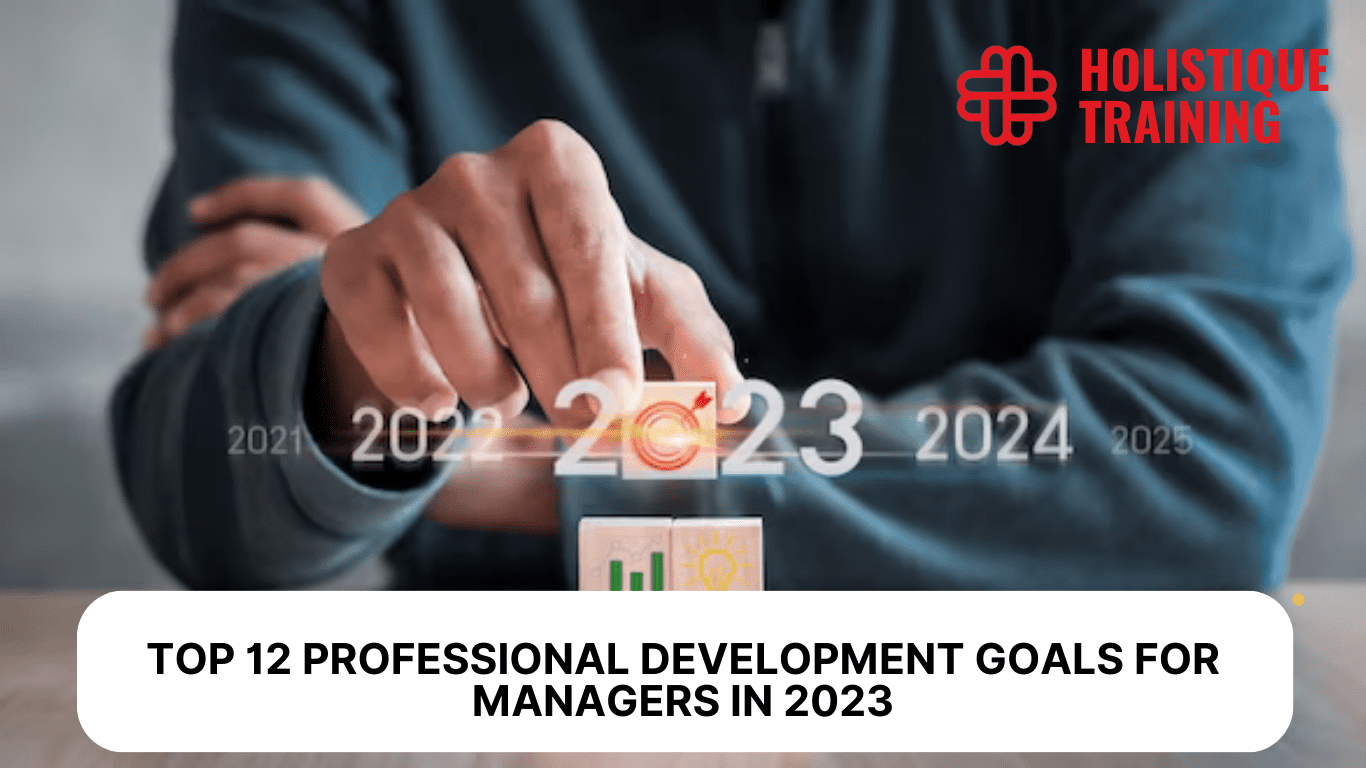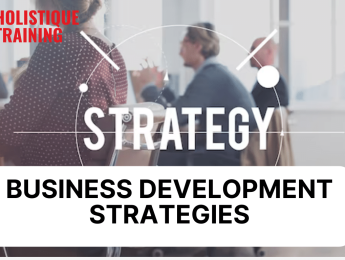Why Is Professional Development Essential for Managers?
Top 12 Professional Development Goals for Managers
How to Develop a Growth Mindset
Personality Goals You Need to Set As a Manager
What You Need to Do to Reach Your Goals
The Role of AI in Helping You Reach Your Personal and Professional Goals
Introduction
Embarking on the managerial journey is akin to setting sail in a sea of endless possibilities. In this ever-changing landscape, the compass guiding managers is not just their skills, but their commitment to continuous growth. Professional development isn't a mere checkbox; it's the dynamic force propelling managers toward leadership excellence. In this blog post, we delve deep into the core of managerial evolution, exploring not only the goals that shape leaders but also the mindset and tools that pave the way for transformative success. Join us as we unravel the secrets to unlocking the full potential of managers in the modern age.
Why Is Professional Development Essential for Managers?
Professional development for managers is not just a box to be checked off in the corporate world; it is the lifeblood of effective leadership and organisational growth. The significance of ongoing learning and skill enhancement cannot be overstated. Here’s a deeper exploration of why professional development is essential for managers:
Enhanced Leadership Skills
Effective leadership is not innate; it’s a skill honed through continuous learning and practice. Professional development programmes offer opportunities to refine leadership skills, empowering managers to guide their teams with vision and confidence.
Increased Employee Engagement
A manager’s ability to engage employees directly impacts productivity and job satisfaction. Professional development equips managers with the tools to inspire and motivate their teams, creating a positive work environment where employees feel valued and engaged in their tasks.
Adaptation to Industry Trends
Industries are in a constant state of flux, with new technologies and methodologies emerging regularly. Managers need to stay abreast of these changes to make informed decisions. Professional development ensures that managers are equipped to adapt, integrating new trends seamlessly into their strategies.
Improved Problem-Solving Abilities
Challenges are inherent in any workplace. Professional development sharpens a manager’s problem-solving abilities, fostering critical thinking and strategic planning. Managers who can adeptly navigate challenges contribute significantly to their organisation’s success.
Career Advancement Opportunities
For managers aspiring to climb the corporate ladder, continuous learning is non-negotiable. Professional development not only enhances current roles but also opens doors to higher positions and greater responsibilities. It’s a pathway to career advancement and personal fulfilment.
Boosted Confidence and Self-Esteem
Confidence is the bedrock of effective leadership. Through professional development, managers gain expertise and experience, leading to boosted confidence in their abilities. This newfound self-assurance permeates their leadership style, inspiring trust and respect among team members.
Professional development is not just a means to an end; it is a mindset, a commitment to lifelong learning. Managers who invest in their development not only enrich their own skill sets but also contribute significantly to the growth and vitality of their organisations. It’s a journey of self-discovery and empowerment, essential for any manager aiming not just to survive but to thrive in the complex and ever-changing business landscape.
Enhanced Decision-Making Skills
Managers often find themselves at crossroads, making decisions that can shape the future of their teams and organisations. Professional development hones their decision-making abilities, enabling them to analyse situations from multiple perspectives, weigh the risks, and make well-informed choices. Managers with enhanced decision-making skills steer their teams confidently, even in the face of uncertainty.
Improved Employee Retention
A skilled and empathetic manager can significantly impact employee retention rates. Through professional development, managers learn techniques to understand their team members' needs, provide necessary support, and create a conducive work environment. This supportive atmosphere fosters loyalty among employees, reducing turnover rates and ensuring continuity within the organisation.
Effective Change Management
In today’s rapidly evolving business landscape, change is inevitable. Managers proficient in professional development understand change management theories and strategies. They can guide their teams through transitions smoothly, mitigating resistance and ensuring that the organisation adapts seamlessly to new challenges and opportunities.
Cultivation of Innovation
Innovation is the cornerstone of progress in any industry. Professional development nurtures a manager’s creativity and innovative thinking. By staying updated with the latest trends and exploring new ideas, managers can inspire their teams to think outside the box. Cultivating innovation not only leads to the development of new products or services but also fosters a culture of continuous improvement within the organisation. Managers who encourage innovation drive their teams to explore uncharted territories, fostering a spirit of entrepreneurship and adaptability.
Top 12 Professional Development Goals for Managers
#1 Enhancing Communication Skills
Effective communication is not just about speaking; it's about being able to convey ideas clearly, listen actively, and understand the nuances of non-verbal cues. Managers should focus on improving both written and verbal communication skills. They can engage in workshops and public speaking events, practise active listening during team meetings, and encourage an open-door policy to facilitate transparent communication channels.
#2 Mastering Time Management
Time management skills are indispensable for managers juggling multiple tasks and responsibilities. Setting priorities, creating schedules, and utilising time management tools can help managers optimise their workday. Additionally, learning to delegate tasks effectively empowers managers to focus on high-priority assignments, enhancing overall productivity and efficiency.
#3 Strengthening Decision-Making Abilities
Decision-making is a blend of art and science. Managers should focus on honing their analytical skills, gathering relevant data, and considering the long-term consequences of their choices. They can practise scenario analysis, seek mentorship from experienced leaders, and engage in decision-making simulations to refine their abilities in making strategic and impactful decisions.
#4 Developing Emotional Intelligence
Emotional intelligence encompasses self-awareness, empathy, and social skills. Managers can invest in understanding their own emotions and recognising emotions in others. This awareness helps in managing conflicts effectively, building strong relationships, and creating a positive work environment. Emotional intelligence workshops and self-reflection practices can aid managers in developing this essential trait.
#5 Cultivating Conflict Resolution Skills
Conflict is inevitable in any workplace. Managers should focus on understanding the root causes of conflicts, active listening, and employing mediation techniques. By fostering an atmosphere where conflicts are addressed constructively, managers can transform disagreements into opportunities for growth and learning, creating a harmonious work environment.
#6 Empowering and Motivating Teams
Empowering and motivating teams require inspirational leadership. Managers can set clear goals, provide regular feedback, and recognise and celebrate achievements. Moreover, understanding the unique strengths and weaknesses of team members allows managers to assign tasks effectively, fostering a sense of ownership and enthusiasm among employees.
Table 1: Personal and professional goals for managers
Personal Goals | Professional Goals |
Improve Time Management | Enhance Communication Skills |
Practice Work-Life Balance | Master Project Management |
Enhance Emotional Intelligence | Develop Strategic Thinking |
Foster Work Relationships | Become an Inspirational Leader |
Prioritise Health and Wellness | Improve Decision-Making Skills |
Cultivate a Growth Mindset | Lead High-Performing Teams |
Pursue Lifelong Learning | Implement Innovative Solutions |
Enhance Public Speaking Skills | Develop Conflict Resolution Skills |
Practice Effective Networking | Excel in Financial Management |
Enhance Creativity and Innovation | Foster a Diverse and Inclusive Culture |
#7 Continuous Learning and Skill Enhancement
Lifelong learning is the cornerstone of professional growth. Managers can pursue further education, attend industry conferences, and participate in online courses. Additionally, engaging in cross-functional projects within the organisation exposes managers to diverse perspectives, enhancing their skill set and adaptability. And statistics sure do support that—with studies indicating that individuals participating in structured training programmes experience a significantly greater success rate. Those who engage in formal training not only achieve success more frequently but also enjoy a remarkable 22% higher return on investment within the initial year compared to their counterparts who do not undergo such training, according to Eventible.
#8 Building a Diverse and Inclusive Work Environment
Embracing diversity and inclusivity is not just a goal but a responsibility for managers. They can initiate diversity training programmes, establish inclusive hiring practices, and create an environment where different voices are not only heard but valued. A diverse workforce brings a variety of viewpoints, fostering innovation and creativity within multicultural teams.
#9 Networking and Relationship Building
Networking is more than just exchanging business cards; it’s about building genuine relationships. Managers can attend industry events, join professional organisations, and actively engage in online forums. These connections not only provide insights into industry trends but also create opportunities for collaboration, mentorship, and career advancement.
#10 Project Management Mastery
Effective project management is crucial for achieving organisational goals. Managers can enhance their project management skills by obtaining certifications such as signing up for PMI-registered courses and PRINCE2. Additionally, utilising project management software and learning agile methodologies equips managers to lead successful projects from initiation to completion.
#11 Financial Acumen
Understanding financial principles is essential for making informed business decisions. Managers can undertake finance courses to grasp concepts such as budgeting, financial forecasting, and ROI analysis. This knowledge enables managers to align their strategies with the financial objectives of the organisation, contributing to its overall success.
#12 Mentoring and Coaching
Being a mentor or coach is a rewarding experience that fosters a culture of learning within the organisation. Managers can develop their mentoring skills by actively listening to their team members, providing constructive feedback, and guiding their professional development. Mentorship not only accelerates the growth of individuals but also creates a cohesive and supportive team environment.
How to Develop a Growth Mindset
In pursuit of professional development goals, one key factor often overlooked is the development of a growth mindset. This mindset is the belief that abilities and intelligence can be developed through dedication and hard work. Here's how managers can cultivate a growth mindset:
Embrace Challenges
Rather than avoiding challenges, a growth mindset encourages individuals to welcome them as opportunities for growth. Challenges become stepping stones, not insurmountable obstacles. Embracing challenges with an open mind and a willingness to learn allows managers to develop new skills and strategies.
Learn from Criticism
Constructive criticism is a valuable source of feedback. Instead of taking it personally, individuals with a growth mindset view criticism as a chance to improve. They dissect feedback, extract valuable insights, and use it to refine their skills and approaches.
Cultivate Persistence
In the face of setbacks, a growth mindset encourages persistence. Instead of seeing failure as a permanent condition, individuals with a growth mindset view it as a temporary setback. They analyse what went wrong, adjust their strategies, and persevere. This resilience is key to overcoming challenges and achieving long-term goals.
Value Effort
A growth mindset emphasises the importance of effort. It’s not just about the end result but the journey and the effort put into it. By valuing effort, individuals acknowledge the process of learning and understand that improvement comes with consistent dedication and hard work.
Embrace Learning and Growth
Cultivating a growth mindset involves a deep love for learning. It's about being curious, asking questions, and seeking knowledge. Managers can foster this mindset by continuously learning new skills, exploring different perspectives, and being open to experiences outside their comfort zone.
Cultivate Self-Reflection
Self-reflection is a powerful tool for developing a growth mindset. Managers can engage in regular self-assessment, identifying their strengths and areas for improvement. By acknowledging their own limitations and biases, they open the door to growth and self-improvement.
Change the Inner Dialogue
The way individuals talk to themselves matters. A growth mindset involves changing negative self-talk into positive affirmations. Instead of saying, “I can’t do this,” individuals with a growth mindset say, “I can’t do this yet.” This shift in language indicates the belief in one’s ability to improve and learn over time.
Seek Inspiration from Others
Learning from the experiences of others is a hallmark of a growth mindset. Managers can find inspiration in biographies, success stories, and TED talks. By understanding the journeys of successful individuals, they realise that even the most accomplished people faced failures and challenges before achieving greatness.
Encourage a Growth Mindset in Others
A growth mindset is contagious. Managers can create an environment that encourages employees to embrace challenges, learn from mistakes, and value effort. By celebrating employees’ progress and emphasising the importance of growth, managers inspire their teams to adopt a growth mindset, creating a positive and empowering workplace culture.
In summary, developing a growth mindset is not a one-time task but a continuous process. It requires self-awareness, a willingness to learn, and the determination to face challenges head-on. By cultivating a growth mindset, managers not only enhance their own capabilities but also inspire those around them to reach for new heights, fostering a culture of continuous improvement and innovation within their teams and organisations.
Personality Goals You Need to Set As a Manager
While professional skills are crucial, a manager's personality traits also play a significant role in their success. Here are some personality goals managers should consider:
Empathy
Strive to understand the emotions and perspectives of your team members. Empathetic managers build trust and rapport with their employees.
Resilience
Develop the ability to bounce back from setbacks and maintain a positive attitude in challenging situations. Resilience is contagious and can inspire your team.
Adaptability
Embrace change and adapt to new circumstances with ease. An adaptable manager can lead their team through transitions more effectively.
Humility
Recognise your limitations and be willing to learn from others. Humble managers are approachable and open to collaboration.
Patience
In a fast-paced world, patience is a virtue. Patient managers are more likely to make thoughtful decisions and avoid impulsiveness.
What You Need to Do to Reach Your Goals
Setting professional development goals is just the first step. To turn these goals into reality, managers should follow a strategic plan:
1. Goal Clarity
A surprising revelation emerges from recent findings regarding goal clarity: merely 55% of mid-level managers can identify a single one among their company's top five priorities, according to Collato. This shows that most managers seem to have a hard time specifying their company’s objectives and goals. Specificity is crucial; vague goals lead to unclear paths. One way you could do that is by ensuring your objectives are measurable, achievable, relevant, and time-bound (SMART). This clarity provides a solid foundation upon which your action plan can be built.
2. Self-Assessment
Assess your current skills and competencies related to your goals. Identify your strengths and areas that require improvement. Self-awareness is the cornerstone of personal development, enabling you to focus your efforts on the areas that need the most attention.
3. Create an Action Plan
Transform your goals into actionable steps. Break down your objectives into smaller tasks and set specific deadlines. Create a timeline outlining your short-term and long-term milestones. Allocate resources such as time, energy, and finances to support your journey. An organised action plan provides a clear roadmap, making your goals more achievable.
4. Continuous Learning
Commit to a lifelong learning journey. Stay updated with the latest industry trends, attend workshops, and enrol in courses relevant to your goals. Learning should be a consistent, ongoing effort. Embrace diverse learning methods, from traditional classroom settings to online platforms, tailored to your specific needs.
5. Track Progress
Regularly monitor your progress against the milestones set in your action plan. Use tools and techniques to track your achievements objectively. Celebrate your small victories, as they signify progress and provide motivation. Concurrently, be vigilant about challenges and setbacks; they offer valuable insights for course correction.
6. Feedback and Adaptation
Seek feedback from mentors, colleagues, or industry experts. Constructive criticism is a powerful tool for growth. Be open to feedback, whether positive or negative, and use it to refine your strategies. Adaptation is key; be willing to alter your approach based on the insights gained from feedback.
7. Seek Support and Mentorship
Don’t hesitate to seek guidance from experienced professionals in your field. Mentors provide invaluable wisdom and can help you navigate challenges more effectively. Engage in discussions, ask questions, and learn from their experiences. Supportive networks and mentorship relationships can significantly accelerate your progress.
8. Resilience and Perseverance
Expect challenges and setbacks along your journey. Resilience is the ability to bounce back from failures. Embrace failures as learning opportunities. Analyse what went wrong, extract lessons, and use them to refine your strategies. Persevere through difficulties; tenacity in the face of adversity is often the differentiator between success and stagnation.
9. Balance and Self-Care
Achieving your goals requires dedication and hard work, but it’s also essential to maintain a balance. Avoid burnout by allocating time for relaxation, hobbies, and spending time with loved ones. Physical exercise and adequate sleep contribute significantly to mental clarity and emotional well-being. A balanced life ensures sustained focus and energy for your pursuits.
10. Review and Revise
Periodically review your goals and assess your progress. Are your objectives still aligned with your aspirations? Have your circumstances or priorities changed? Be willing to revise your goals if necessary. Adaptability and flexibility are essential qualities; your goals should evolve as you grow personally and professionally.
In short, reaching your professional development goals is a holistic journey that requires dedication, resilience, and adaptability. With a clear vision, a well-structured plan, a willingness to learn, and a supportive network, you can overcome obstacles and turn your aspirations into reality. Remember, the path to success is not always linear; it’s the continuous effort, learning from failures, and staying committed to your objectives that ultimately lead to fulfilling your professional ambitions.
The Role of AI in Helping You Reach Your Personal and Professional Goals
Artificial Intelligence (AI) has emerged as a powerful tool for personal and professional development. Here's how AI can assist managers in achieving their goals:
Personalised Learning
AI-driven platforms analyse your learning preferences, strengths, and weaknesses. By understanding your unique learning style, AI can curate personalised educational materials. Whether you're acquiring a new language, mastering coding, or delving into leadership principles, AI tailors content to your specific needs, optimising your learning experience.
Data-Driven Insights
AI processes large datasets to extract meaningful patterns and insights. In the realm of personal and professional development, this translates into a profound understanding of industry trends, market demands, and emerging technologies. Managers armed with such insights make informed decisions, steering their teams and organisations toward strategic, future-ready directions.
Task Automation
Mundane, repetitive tasks consume valuable time and energy. AI automates these tasks, liberating you to focus on tasks that demand creativity and critical thinking. Whether it's scheduling meetings, responding to routine emails, or analysing data sets, AI handles the routine, allowing you to channel your efforts into high-impact activities directly related to your goals.
Feedback and Performance Analysis
AI tools assess your performance with precision. In educational contexts, it can evaluate your understanding of concepts and provide targeted feedback. In professional settings, AI analyses your work metrics, providing insights into productivity patterns and areas for improvement. This data-driven feedback loop refines your strategies and hones your skills, accelerating your progress.
Language Processing
Effective communication is fundamental to personal and professional success. AI-driven language processing tools refine your written and verbal communication skills. They offer grammar and style suggestions, ensuring clarity and professionalism in your correspondence. These tools act as virtual mentors, enhancing your communication prowess with each interaction.
Conclusion
Professional development for managers is not a one-time endeavour but a continuous journey. By setting clear goals, cultivating a growth mindset, honing essential personality traits, following a strategic plan, and leveraging the power of AI, managers can unlock their full potential. Embrace the challenges, learn from setbacks, and persist in your pursuit of excellence. Remember, the journey of a thousand miles begins with a single step; take that step, and let your professional development odyssey commence.
And guess what? This single step might just have been bestowed upon you. Our transformative course, ‘Perfecting Your Management and Leadership Skills’ is designed to hone your abilities, refine your strategies, and inspire visionary leadership. This course is the compass guiding you toward managerial excellence. Seize the opportunity and embark on a transformative learning experience that will reshape your professional trajectory. Enrol now!
Frequently Asked Questions(FAQ)
ما هي إدارة المشاريع؟
إدارة المشاريع هي نهج منهجي يهدف إلى تخطيط وتنظيم وتنفيذ ومراقبة والإشراف على إتمام عمل الفريق لتحقيق الأهداف من المشروع وتلبية معايير النجاح المحددة في المشروع. يتمثل الهدف الرئيسي لإدارة المشاريع في تحقيق أهداف المشروع بالطريقة الأنسب، بمراعاة محددات مثل الزمن والتكلفة ونطاق العمل والجودة.





















